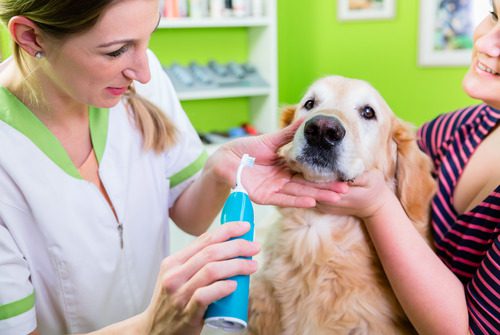Bad Breath or Something More? How Pet Dental Care Impacts Overall Health
It’s easy to dismiss bad breath in dogs as something normal—after all, they explore the world with their mouths. But when your dog’s breath becomes especially unpleasant, it could signal more than just a need for a breath mint. If you’ve ever asked yourself, “Why does my dog’s breath smell so bad?”, you’re not alone. That foul odor could be an early warning sign of dental disease or another health issue that requires veterinary attention. At Animal Hospital of Lake Villa, we believe that routine dental care does more than freshen breath—it supports your dog’s overall health and longevity. Let’s take a closer look at how dental care impacts your dog’s health and what that bad breath might really mean.

Why Does My Dog’s Breath Smell So Bad?
Dog breath has a reputation for being a little funky, but there’s a difference between normal and concerning. If you’re wondering why does my dog’s breath smell so bad, the answer often begins in the mouth but can also involve deeper health concerns.
Plaque and Tartar Buildup
One of the most common causes of bad breath in dogs is plaque that hardens into tartar. Bacteria thrive in this buildup, creating an odor that can’t be ignored. Without regular cleanings, this process accelerates, leading to inflammation and infection in the gums. Over time, tartar pushes beneath the gumline, triggering gingivitis and periodontal disease. At this stage, your dog may experience pain while eating, drooling, or even bleeding from the gums. The bacteria involved in this process are also responsible for that persistent odor you’re smelling.
Gum Disease: A Silent but Serious Threat
Periodontal disease affects more than just the teeth. When bacteria seep below the gumline, they can enter the bloodstream and impact internal organs, including the heart, liver, and kidneys. Many pet owners first notice a problem when their dog’s breath becomes especially foul—yet by that time, the disease is often advanced. If you’re still wondering, “Why does my dog’s breath smell so bad?”, it may be time to schedule a dental exam. Call (847) 356-8387 today to book an appointment with our veterinary team in Lake Villa, IL.
Dental Health and Its Link to Systemic Illness
Your dog’s mouth provides a window into their overall health. While bad breath often signals dental disease, it can also point to issues affecting other parts of the body.
How Oral Bacteria Affects the Heart and Kidneys
When oral bacteria enter the bloodstream, they don’t stay in the mouth. They travel to vital organs, where they can trigger chronic inflammation. The heart and kidneys are especially vulnerable. In fact, studies have shown a strong connection between periodontal disease and endocarditis, an infection of the heart valves.
Similarly, the kidneys, which filter waste from the blood, can become overburdened by bacterial toxins. Over time, this can contribute to kidney disease, which may remain undetected until significant damage has occurred. The next time you ask yourself, “Why does my dog’s breath smell so bad?”, consider that the odor could be more than just an annoyance—it might be an indicator that your dog’s internal systems are under stress.
Common Symptoms of Dental Disease in Dogs
Recognizing the signs of dental trouble early can help you intervene before health issues become serious. While bad breath is often the first symptom that grabs your attention, other changes might also signal a problem:
- Red or swollen gums
- Brown or yellow buildup on the teeth
- Drooling more than usual
- Pawing at the mouth
- Difficulty chewing or eating slower than normal
- Blood on chew toys or in the water bowl
If your dog is showing any of these symptoms—and especially if you’re repeatedly wondering “Why does my dog’s breath smell so bad?”—contact Animal Hospital of Lake Villa at (847) 356-8387 to schedule a dental evaluation. Early detection makes a big difference.
The Importance of Professional Dental Cleanings
Professional dental cleanings under anesthesia remain the most effective way to treat and prevent dental disease. These procedures allow veterinarians to clean beneath the gumline, where bacteria and tartar often hide.
What Happens During a Veterinary Dental Cleaning?
- Pre-anesthetic bloodwork: This helps ensure your dog is healthy enough for anesthesia.
- Scaling and polishing: A dental scaler removes plaque and tartar from the tooth surface and below the gums.
- Dental X-rays: These reveal damage beneath the surface that isn’t visible during a routine exam.
- Extractions (if needed): Severely damaged teeth may need to be removed to stop infection from spreading.
Following a cleaning, many pet owners notice an immediate improvement—not just in breath, but in their dog’s energy and appetite. If you’ve been asking, “Why does my dog’s breath smell so bad?”, a dental cleaning might be the answer.
At-Home Dental Care: What You Can Do
While professional cleanings are essential, daily care at home helps prevent plaque buildup between visits. It’s not always easy to brush your dog’s teeth, but even small steps can make a difference.
- Use a vet-approved dog toothbrush and toothpaste. Never use human toothpaste.
- Start slowly. Introduce brushing as a positive experience with treats and praise.
- Dental chews and water additives can supplement your brushing routine.
- Offer dental-friendly toys that help reduce plaque as your dog chews.
Even if brushing isn’t a daily routine in your household yet, it’s worth trying. If you’re still left wondering why does my dog’s breath smell so bad, these at-home habits can support better oral hygiene and help you notice changes earlier.
When Bad Breath Signals Something More Serious
While dental disease is the most common reason for bad breath, it isn’t the only one. Certain illnesses unrelated to the mouth can also produce foul odors. That’s why a full veterinary evaluation is essential if the smell lingers or worsens.
Other Causes of Persistent Bad Breath
- Kidney disease: A strong ammonia or urine-like odor may point to kidney dysfunction.
- Diabetes: Sweet-smelling or fruity breath can indicate high blood sugar.
- Liver disease: Accompanied by vomiting, yellowing of the eyes, or appetite loss.
- Foreign objects in the mouth: Sticks, bones, or toys stuck between teeth can become infected.
If your dog’s breath has suddenly changed or smells worse than usual, it’s worth having them examined. Bad breath shouldn’t be dismissed. Call our team at (847) 356-8387 to book a dental assessment at Animal Hospital of Lake Villa.
Take the Next Step Toward Better Health
Asking “Why does my dog’s breath smell so bad?” is more than just a question of comfort—it’s an important part of protecting your pet’s health. Bad breath can be a warning sign of dental disease, systemic illness, or both. By prioritizing dental care and seeking veterinary guidance early, you can help your dog feel better and stay healthier longer. Animal Hospital of Lake Villa is here to support your pet’s dental health at every stage. Call (847) 356-8387 today to schedule your dog’s dental exam and cleaning. A fresher breath—and a healthier future—could be just a phone call away.
About Us
Animal Hospital of Lake Villa has provided compassionate, personalized pet care since 1993. Our Fear Free-certified, AAHA-accredited team helps every pet, even the nervous ones, feel safe and at ease.
